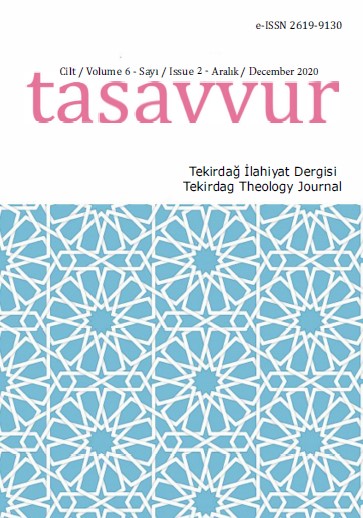Meşşâîlik’ten Devralınan Miras: Ekberî Gelenekte Umûr-ı Külliye Kavramının Mahiyeti ve Kapsamı
The Peripatetic Inheritance: The Nature and Scope of al-Umūr al-Kulliyyah in the Akbarian Tradition
Author(s): Yasin ApaydinSubject(s): Metaphysics, Islam studies, 13th to 14th Centuries, 15th Century, Ontology
Published by: Tekirdağ Namık Kemal Üniversitesi İlahiyat Fakültesi
Keywords: Islamic Thought; Fusūs al-Hikam; Akbarī tradition; al-umūr al-āmmah; al-umūr al-kulliyya;
Summary/Abstract: In the very beginning of his Fusūs al-Hikam, the wisdom of divinity in the Word of Adam, Ibn Arabi mentioned the universal things (al-umūr alkulliyah) and their ontological positions. This term created an overwhelming impression in the Fusūs tradition. Some scholars explained it in the context of the other important term of Akbarian tradition, namely immutable identities (al-a‘yān al-thābitah), while some others approached within the problem of mental existence (al-wujūd al-dhihnī). Based on this variety, some contemporary researchers try to connect the so-called universal things with the problem of non-existents in kalam tradition or with the universals of Avicennan tradition. In this paper, I will try to examine if the universal things has any connection with another discussion called al-umūr al-āmmah both in Avicennan and Kalām tradition especiallly after al-Rāzī who introduced it to mutakallimun. While doing so, I will reference to the first commentator of Fusūs i.e. al-Jandī’s commentary and his reception of the universal things as al-umūr al-āmmah. Additionally other commentators such as Tilimsānī (d. 690/1291), Qāshānī (d. 736-1335), Qaysarī (d. 751/1350), Ibn Turkah (d. 836/1432), Yazıcızāde Mehmed (d. 855/1451), Mullā Jāmi (d. 898/1492) will be covered to pursue the process of how they dealt with this issue. Focusing on the metaphysical aspect of universal things as tools to connect between God and the universe and its epistemological aspect as being considered secondary intelligibles I will try to compare between these two terms, one from peripatetic and kalām tradition and the other from Akbarian tradition and discusses whether these similarities led to connect each other.
Journal: Tasavvur Tekirdağ İlahiyat Dergisi
- Issue Year: 6/2020
- Issue No: 2
- Page Range: 1043-1072
- Page Count: 30
- Language: Turkish

